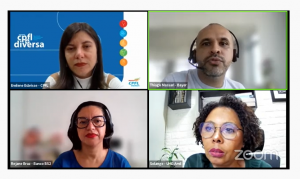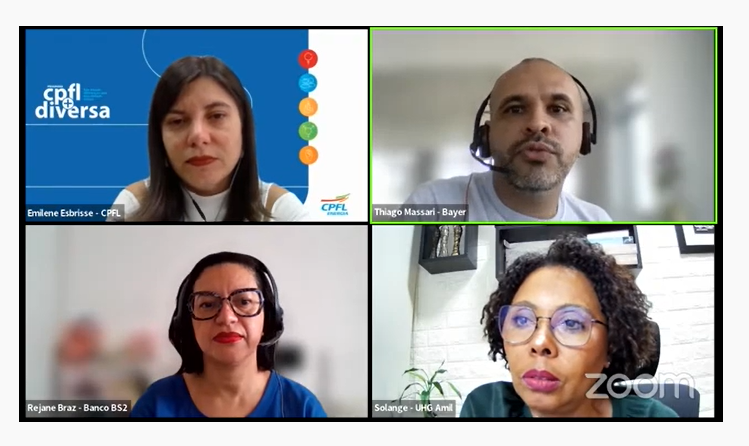“Communication Crises in diversity and inclusion” was the theme of Aberje’s first Diversity Lab
The online meeting brought together communication professionals from different industries

Aberje held in August its first Communication Lab for Diversity in 2022. The theme was “Communication Crises in Diversity and inclusion.” Thiago Massari, Bayer’s Integrated Communication Leader in Brazil; Emily Esbrisse, an expert in Diversity, Equity, and Inclusion at CPFL Energia; and Rejane Braz, BS2 Bank Communication Manager, were the guest panelists. Solange Guimaraes, External Communication Manager at UnitedHealth Brasil Group, acted as the mediator.
At the opening, Guimaraes stressed the importance of the theme of Diversity and Inclusion (D&I) in companies. “Diversity is a win for businesses since diverse environments are more innovative, creative, and produce more and better. But we are far from being a society that welcomes differences. It has already been said that it is during crises that progress takes place, and communication is becoming increasingly necessary at those times.”
“Diversity is relatively new and not fully structured yet, and we have not experienced a major crisis so far. When that happens, you need to have something that keeps you grounded, which I think is the support you have within the company,” said Rejane Braz. “This support network is critical.”
Then, Emily Esbrisse said that the CPFL Group has always had a solid social line with very relevant projects. “We started our journey in the CPFL Mais Diversa program in 2020 to seal something we were already talking about and that, through the program, we managed to achieve and organize better. Something that can impact our people,” she said. “The first step was to recognize that it would be a journey,” she said, emphasizing that not everyone recognized the program as something important.
In 2020, Bayer’s trainee program – held every two years – offered its positions exclusively for Black applicants. “We did this affirmative action to recognize that we also needed to bring more Black people into the organization by leveraging them to leadership positions. There were 25,000 enrolled and 1.250 candidates for 19 trainee positions. Black women filled 84% of them”, said Thiago Massari. “There are always biases, and we need to educate our internal public and help educate society about these changes. Our stance is very educational, bringing evidence and showing data, without giving room for discrimination or hatred.”
And how should companies prepare for the future in crisis management in this area? “I think it all starts with prevention. People tend to think crisis management is just the time and often look for a recipe that does not exist. Each crisis is different from the others. You can have a handbook, know who your allies are, study, talk, search for a support network, and learn from the other’s crisis,” said Braz.
“You need to have goals and concentrate energies on them to conquer space. I see many people who work with diversity frustrated because they want to do everything simultaneously. Often the company is not prepared, and the culture is not at pace. Ricardo Sales [consultant and coordinator of the Diversity Program in Aberje School organizations] says something I like a lot: More important than having pace is to have direction; each organization has its rhythm,” said CPFL’s Esbrisse.
There is still much to be done in terms of D&I in organizations, but many seeds have already been planted. That is what Bayer’s Massari thinks. “We are all evolving. Change is possible; we need to believe it. We recognize that the journey is long, but we are at a different point from it than we were some time ago. It is a great motivator for me,” he said. As for Braz, from BS2 Bank, “anyone who wants to navigate this path needs to read, study, search for a reality different from theirs.”
Watch the session here: https://youtu.be/O9On4UQeADk
Destaques
- Theme of the Year “Communication for Transition” Renewed for 2025
- Web Summit Lisbon 2024: Innovation and Ethics in a Future Shaped by AI
- Global Alliance Launches Recognition Program for Young Communicators
- Alejandro Cornejo Montibeller Joins the Latin American Regional Council of the Global Alliance
- LiderCom Meeting Discusses International Expectations for COP30
ARTIGOS E COLUNAS
Carlos Parente Na comunicação, caem por terra influencers sem utilidade e erguem-se, aos poucos, os curadores de conteúdoGiovanni Nobile Dias Como você tem nutrido seu cérebro?Marcos Santos Por tempos melhoresThiago Braga O impacto de modernizar a Comunicação Interna em uma grande indústriaGiovanni Nobile Dias O alarmante retrato da leitura no país




























